Washington, D.C.
Does requiring pharmacists to dispense medication they find morally objectionable violate their rights to the free exercise of religion? Or, are religious objections secondary to a woman’s right to receive an approved prescription in a timely manner?
These questions are sparking legislative debates across the country as pharmacists are refusing to fill prescriptions for contraception or emergency contraception (a general term for several different types of birth control pills used within 72 hours of unprotected intercourse to prevent a pregnancy).
Four states (Arkansas, Georgia, Mississippi and South Dakota) have already passed laws, often called “conscience clauses,” that specifically allow for pharmacists’ refusals. Meanwhile, Illinois has passed an emergency law requiring pharmacists to dispense FDA-approved contraception, and California now requires that a pharmacist must obtain an employer’s approval for a refusal and ensure the woman can still access the drug quickly.
The August, 2006, decision by the FDA to make “Plan B,” an emergency contraceptive, available over the counter to women over 18, has done little to settle the debate about whose rights come first – the patient’s or the pharmacist’s.
The Pew Forum, the American Constitution Society and the Federalist Society invited two experts from opposing viewpoints on the issue to frame the issue and offer their perspectives.
Speakers: Kevin J. “Seamus” Hasson, Founder and Chairman, the Becket Fund for Religious Liberty Jill C. Morrison, Senior Counsel, the National Women’s Law Center
Moderator: Liz Seaton, Associate Director of Programs, the American Constitution Society
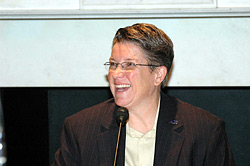
LIZ SEATON: My name is Liz Seaton, and I’m with the American Constitution Society, and I want to welcome you to this forum today. We are co-sponsoring this event with the Pew Forum on Religion & Public Life and the Federalist Society. I want to thank the Pew Forum in particular for arranging for this space for us today.
Today’s topic is a very timely one; that’s proven by your attendance here. What we’re talking about today is the debate over the role of religion in the provision of health care, and my job is simply to facilitate the conversation and also to introduce our two panelists.
I’m going to start with Jill Morrison because she’s speaking first. Jill Morrison is the senior counsel at the National Women’s Law Center. On my left is Seamus Hasson – Kevin Hasson is his formal name, but he goes by Seamus – and he is the founder and chairman of the Becket Fund. They are both experts in this area and have a lot to discuss with us today.
Our format will be for Jill and then Seamus to give us a definition of the problem, from their perspectives, and then we’re going to open it up for a broader conversation.
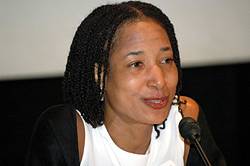
JILL C. MORRISON: Thank you for having me here.
I’m defining the problem as the idea that enough is enough. First of all, refusal clauses have gone too far. The very first refusal clause appeared shortly after Roe v. Wade. This refusal clause was called the Church Amendment, named after its sponsor, Senator Frank Church, and it allows hospitals to refuse to allow abortions or sterilizations on their premises, and it also allows doctors or nurses to refuse to participate in procedures without getting fired or demoted.
While it is disturbing that doctors refuse to provide needed services, I can live with it, but now we are seeing refusals far beyond the Church Amendment. The hot topic now is, of course, pharmacist refusals. Some pharmacists don’t think there is any distinction between the practice of pharmacy and the practice of medicine when it comes to the right to refuse, but one quick example illustrates why the two health professions are simply not the same. I don’t want a doctor performing my abortion if he has moral reservations about it. Thanks but no thanks. But if a pharmacist hands you the morning-after pill, and he stays awake that night tossing and turning and wondering whether or not sperm met egg, or worrying about my uterine lining, I’m okay with that. I will still benefit from an 89 percent reduced risk of pregnancy, despite the pharmacist’s moral objections.
Since the Church Amendment, states have taken the refusal concept and run with it. Now there are refusal clauses covering a variety of services, entities and individuals. A New Jersey legislator introduced a refusal bill that includes everything you can imagine related to health care. It includes a provision that allows prosthetics technicians the right to refuse – they are people who fit limbs for those who are missing limbs. Are doctors going to protest the war by refusing to fit a veteran with a new arm or leg?
It is very easy to see how this can get out of control. Vetoing a similar bill, Wisconsin Governor Jim Doyle said, “Because it puts a doctor’s political views ahead of the best interests of patients, this legislation ought to be called ‘the unconscionable clause.’” I would agree with him, and enough is enough.
These refusal bills are just greasing an already slippery slope. Consider that stem cell research may eventually result in treatments, including prescription treatments. Right now, contraceptive drugs are the target of refusals, but that could change. When stem cell therapies become available, patients seeking prescriptions to treat cancer, diabetes, or heart disease may all be turned away by a pharmacist who opposes the destruction of eight-cell embryos.
So that’s the first problem. Refusals have gone too far and the trend toward even broader refusals is a dangerous one.
The second problem is that Title VII of the Civil Rights Act provides enough protection for religious beliefs in the workplace, so we don’t need any additional protections. Title VII strikes a balance between the rights of religious workers, the employers’ need to run a business, and the rights of third parties including co-workers, patients and customers. The health care cases decided under Title VII show that courts are willing to punish employers who don’t attempt to accommodate the religious beliefs of their employees. The cases also show that courts are strongly opposed to religiously based acts that could harm customers and patients.
Simply put, Title VII is working. There are pharmacists quietly stepping away and co-workers stepping in to make sure that patients get what they need. Unfortunately, extreme-minded individuals are driving litigation laws and policies, for example the pharmacist who compares transferring a prescription for contraception to “murder for hire,” or the pharmacy technician who refuses to put the birth control pills in a bag after another pharmacist has filled the prescription. This simply shouldn’t be, and individuals who hold such strong beliefs should be willing to tailor their career choices accordingly. The Title VII cases show that the law works to protect religious liberty but not at the expense of public health and patient safety.
Finally, the very reason for the licensing and regulation of the health professions is to protect patients and advance public health. Providers are not regulated for the purpose of protecting their own rights. The licensed individuals or entities have responsibilities that may sometimes be more important than their religious rights. A California court made this clear in a case when a rape victim went to a Catholic hospital and wasn’t told about emergency contraception. “The court agreed” – I’m quoting here – “that the appellant’s right to control her treatment must prevail over the respondent’s moral and religious convictions.”
For pharmacists, their licenses amount to a monopoly on the right to dispense prescription drugs. The role of the pharmacist in the healthcare system is crucial to patients’ ability to follow doctors’ orders. The American Pharmacists Association says it best in its code of ethics: “Pharmacists are health professionals who assist individuals in making the best use of medications.”
As I explained, Title VII does afford some protection for the religious practices of health care workers, but ultimately those interests are secondary. Even in emergency situations, the protection offered by the Church Amendment gives way to the needs of the patient. So when resolving the ultimate conflict between workers’ religious rights and patients’ need for care, courts, laws and policies must continue to protect patients. Thank you.
MS. SEATON: Thanks so much, Jill. Let me turn it over to Seamus now.
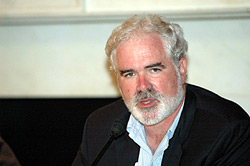
KEVIN J. “SEAMUS” HASSON: Thank you. First off, you may notice that I’m shaking. This is not because I’m afraid of you; it’s because I’m afraid of Liz. (Laughter.) This is the only thing that Michael J. Fox and I have in common. Parkinson’s is good for some things. I find I can make a much better martini now. (Laughter.) It’s also a great excuse for a bad golf game. People used to say, “Look at that guy, he’s trying to play golf.” Now they say, “Look at that guy! He’s trying to play golf!” (Laughter.)
I look at this issue from a broader perspective. I want to talk about where conscientious objection came from and why I think it’s important because what we’re talking about here is refusal to prescribe Plan B based upon conscientious objection.
Conscientious objection was controversial in America beginning in the 17th century. You’ll all remember the Massachusetts Puritans from the year in high school you were supposed to read “The Scarlet Letter,” where a scarlet “A” was sewn to a woman’s clothes as punishment for adultery. That punishment was actually soft. For committing crimes in Massachusetts, you typically got letters branded to your skin. You got an “A” branded to your skin for adultery, a “G” for gluttony and “D” for drunkenness.
The Puritans didn’t tolerate much dissent. They handed out severe punishments for any number of crimes, one of which was refusal to serve in the militia. The colonies had no standing armies, so they defended themselves by requiring every able-bodied man to serve in the militia. There were stiff penalties for refusing to participate.
This worked pretty well until the Quakers came along. The Quakers believed it was wrong to fight in any circumstance; it would violate their consciences to do so. This position didn’t go over well in Massachusetts, or in Maryland, or Virginia, or in most of the colonies. Every one required militia service, and none of them made exceptions for Quakers. Only Pennsylvania – founded by a Quaker – and Rhode Island, which extended tolerance to Quakers, made exceptions. That is, they made exceptions so long as it was convenient.
By the time the Revolutionary War rolled around, conscientious objection wasn’t convenient anywhere. Every colony, including eventually Rhode Island and Pennsylvania, went on to require service in the militia. Things didn’t get any easier when the Revolutionary War was over. Quakers continued to refuse military service – and be punished for doing so – right up to the Civil War. It took 200 years for the Quakers’ general stubbornness to prevail. The first victory was in the Civil War, when both sides had conscription. Quakers on either side were punished for refusing to fight, and Quakers singled out by the North Carolina militia for refusing to serve were literally hanged by their thumbs, beaten, starved, then sentenced by court martial to the firing squad. On the Union side, Quakers continued to petition the president for an exemption from military service, and Lincoln came out with the first CO provision in American history, and CO provisions have been in place ever since.
In the Vietnam War, Congress voted to extend the conscientious objector statute to cover not just religious conscientious objectors but also philosophical conscientious objectors, so that anybody who meets those philosophical or religious criteria for not fighting in the war would have the option of doing non-combat work.
Now, why should that be? Why should it be that conscientious objectors who refused service in the war could avoid fighting, while those who just don’t want to fight still had to do so? Remember Yossarian in “Catch-22” – another novel you were supposed to have read in high school? Yossarian didn’t want to fight. His commander said, “Why not?” And he said, “Because they’re trying to kill me.” (Laughter.) His commander said, “They’re trying to kill everybody.” He said, “What difference does that make?”
Yossarian had a point. His commander’s point in response, though, was that if the state is under attack, then everybody is under attack, and the state can conscript unwilling people to defend it. But the state isn’t conscripting everybody. It’s excusing conscientious objectors, and it excuses conscientious objectors to this day – but only conscientious objectors, not people who think the war is dumb, not people who think the war is too expensive, not people who think the war is being conducted badly – all sorts of people like Yossarian, who just don’t want to get shot. All of them must go out and fight, but conscientious objectors get to stay.
Why is that? Because of the lesson the Quakers taught us over 200 years ago: that conscience is special. Conscience is something good in our society. It’s a human good, and it deserves special attention. I’m delighted when people have consciences and take stands on moral principles. Isn’t it good for society? It may be inconvenient with military operations if somebody’s not willing to fight, and it may be inconvenient if somebody’s not willing to take an oath or get vaccinated. But overall, conscience and moral principles are good things for society, and we as a society should recognize that.
In that context come the conscience clauses for Plan B. Within the minds and hearts and consciences of the people who refuse to prescribe or sell Plan B, the issue is identical to how it was in the minds and hearts of the Quakers who refused to fight in military service. In their conscience it’s a question of life and death. And just as we’ve made exceptions for conscientious objectors in the military context, so we should make exceptions for those who refuse to sell Plan B. We should respect their consciences, even if we disagree with them. Despite all the doomsday scenarios out there, permitting conscientious objection won’t stop the drug from being available except in the most extraordinary circumstances, and those are difficult to imagine in a day when you can pick up the Yellow Pages and find pharmacies on every corner.
MS. SEATON: Thanks so much. Now I want to open it up for questions.
UNIDENTIFIED QUESTIONER: My question is for Ms. Morrison. If the statutory language is permissive and not mandatory – that is, if the language says we allow for those who chose not to prescribe, then why does the populace not have the faith in the market to solve the problem? The customer is always right. If the customer wants to go to a pharmacy that allows for unfettered prescriptions, then they go there. I don’t see the real controversy here.
MS. SEATON: Maybe you could restate the question, Jill, and then answer it.
MS. MORRISON: The question is, why not allow for the choice of some pharmacies to refuse if there’s always the option to go to another pharmacy. In other words, just let the market sort it out – is that correct?
UNIDENTIFIED QUESTIONER: That’s right.
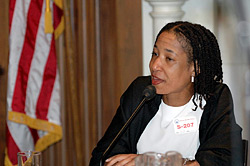
MS. MORRISON: Unfortunately, what we’ve found is that it’s not so simple. Sometimes there are serious access issues when it comes to certain drugs. Even in an urban area such as Chicago there have been some problems in getting Plan B.
Also, as the holder of a license, it’s not as free of a market as other products because pharmacists have a monopoly on the ability to dispense prescription drugs. We’re not talking about soda or candy here. In the case of prescription drugs, it’s been determined that it’s necessary for patient health and safety for individuals to have access to these drugs, and if there needs to be some regulation when we start seeing serious access problems, then I think that regulation should be in place rather that just leaving it to the market.
NATHAN DIAMENT, ORTHODOX UNION: You seem to be very focused on Plan B and women’s health issues here, but I want to know how far your perspective on the conscience issue goes. When Oregon enacted the right for physician-assisted suicide, they specifically put into the statute the right for pharmacists in Oregon to refuse to dispense the prescription that will allow a person to commit suicide. Do you think the Oregon legislature was wrong in allowing pharmacists in Oregon not to participate in assisted suicide?
Beyond that issue specifically, there are a range of conscience issues out there in all kinds of workplaces, whether you’re a Quaker or a Methodist or – different faiths have different conscience issues. Could you speak a little more about other conscience issues in other contexts?
MS. MORRISON: I actually would support Oregon’s method of allowing for conscience because it has adequate safeguards for patients. The way it’s set up in Oregon is a relatively closed system, so both pharmacists and doctors who are prescribing life-ending drugs know where to access them. It’s not as though someone is going to randomly go into a pharmacy with a prescription for a drug that will end their life and be refused. People are working this through with their doctors, so it’s a very close relationship; you’re not going to have an unsuspecting person face a refusal. In that case I think it’s completely legitimate to have pharmacists who chose not to participate in the program because essentially patients are getting advance notice of who participates and who doesn’t, so that’s fine.
With broader conscience issues, as I said, Title VII does a very, very good job in resolving workplace conflicts.
MS. SEATON: Seamus, do you want to comment on that as well?
MR. HASSON: Putting the first two questions together, the market – literally the Yellow Pages and Google and so forth – does a pretty good job of distributing information as to who sells what, and the same thing will undoubtedly be true of Plan B.
UNIDENTIFIED QUESTIONER: I have a question for Ms. Morrison as well. Last week in the Washington Post there was an article about gynecological practices, and it mentioned the Tepeyac Family Center and Dr. John Bruchalski. Dr. Bruchalski is actually my doctor, so I have a bias in favor of him. He is fantastic. His medical practice is structured such that women who go to Tepeyac understand upfront that they will not be prescribed contraception, they will not be given an abortion, they will not be referred to an abortionist.
Would you support the same sort of practice in the pharmacy context so that maybe Catholic pharmacists could set up an independent pharmacy and, as Seamus was saying, broadcast to the world, “This is what we’re all about; this is what we are and are not going to do.”
[of pharmacies]
A religious practitioner could choose to work at a nursing home where he or she wouldn’t have to deal with this, or a Catholic hospital where he or she wouldn’t have to deal with this, or even be in pharmacy research. So there would be other employment options.
But as it stands now, could that system be in place? Sure. I am aware of the Tepeyac Center, and I do definitely support the idea that when women call up for their first appointments they are told this. I would prefer that it also be designated in the HMO book, so you’re aware of this when you’re making a selection. We have them as an option in our health plan, and we have had women from my office call up, who of course do support a full range of options. So I would like that advance notice also.
MR. HASSON: As a practical matter, not every pharmacy, as a business decision, chooses to carry every line of pharmaceutical. The Illinois controversy that’s going on now over the conscience clause points out that only pharmacies that chose to offer prescription contraceptives generally are governed by the requirement to carry Plan B. You can make the business decision in Illinois that you don’t want to cover prescription contraceptives and be fine.
My experience when I travel is not every place has my Parkinson’s drugs. It’s a business decision. So there is no requirement, I should think, that as a business matter, everybody has to carry every pharmaceutical there is, and I don’t see why Plan B should be any different.
MS. SEATON: Another question? I have been handed a note: Would you ask the questioners to state their names and affiliations for the transcript? Thank you for the reminder.
PHILIP DIAMOND, AMERICAN COLLEGE OF OBSTETRICIANS AND GYNECOLOGISTS: This question is for Mr. Hasson. Google and the Yellow Pages may tell me where to get Plan B but they don’t tell me how to get Plan B. There are a significant number of rural areas where there may be only one pharmacy and knowing where another pharmacy is does not get me the drug in a timely fashion. The absence of getting that drug may result in a pregnancy, which has significantly higher risks to my health than taking Plan B.
How do you balance the conscientious objection of the pharmacist versus the fact that their action is going to result in a condition for me that may have adverse effects on my health?
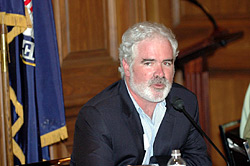
MR. HASSON: When you get into remote territories and extreme examples, then the compelling state interest counterbalances religious freedom or freedom of speech or whatever comes into play. But the vast majority of Americans’ lives aren’t lived in those kinds of circumstances, and the exception shouldn’t drive the rule.
JONATHAN IMBODY, CHRISTIAN MEDICAL ASSOCIATION: For Ms. Morrison: You mentioned that pharmacists can go work somewhere else, but then for somebody seeking Plan B, the inconvenience would be going to another pharmacy. Doesn’t it seem like it’s a far greater inconvenience to lose your job than to simply drive to another pharmacy?
MS. MORRISON: As the doctor just said, sometimes driving to another pharmacy may not be that simple. But also, as the holder of the license, you do have responsibilities to the public that you are serving, and if your beliefs are such that they are so ingrained, then I would certainly think you would be willing to tailor your life accordingly and pick a career where you’re not facing this constant tension between either doing your job or being consistent with your values.
MS. SEATON: Another question?
BOB RITTER, UNAFFILIATED: I’d like to ask both the panelists whether they think the Congress could get involved with this in respect to the interstate commerce clause in terms of either requiring dispensing of the drug by all pharmacists or – (inaudible) – the conscience clause.
MR. HASSON: As a jurisdictional hook, using the commerce clause would do it. There is a free exercise clause for conscientious pharmacists who oppose a requirement that everybody have to dispense. The conscience clause would be welcome whether it’s satisfactory or not – in all circumstances, I’m sure there would be litigation. But it might make things simpler initially anyway.
MS. SEATON: Do you have a view on that, Jill?
MS. MORRISON: There are actually three bills that have been bandied about on just this issue, using the commerce clause as a hook. Whether or not they’ll go anywhere, I tend to doubt it. One of the bills actually uses Medicare and Medicaid payments as a hook, saying that if you choose to participate in this public program, then you choose to play by our rules. It puts the duty on the pharmacy, so it still does protect the individual’s refusal and the individual’s belief by saying that pharmacies must be structured such that patients can get their medicines without delay. So there are three bills out there.
[to freedom]
MS. MORRISON: Well, partly Roe v. Wade. One’s right to be autonomous and have liberty is very much dependent on, for a woman, her right to control her reproductive freedom. So I think these things are relatively enmeshed. Ninety-plus percent of all women use contraceptives. To say that we have no right to them when they’ve become such a crucial part of what allows us to participate in this society, that’s just going to be a difference of opinion we’ll have.
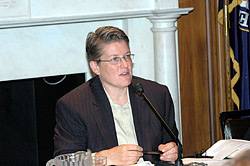
MS. SEATON: Just to restate the question: What makes Ms. Morrison think that there is an affirmative right to receive services or prescription medications? Seamus, do you want to comment?
MR. HASSON: It’s a deeper question than it sounds. It’s not a question of if there is a right. The question is, what’s the nature of the right. Is it a right to be free from governmental interference, or is it a right to have the government actually provide you with services? That’s a much more substantial question.
MS. BAILEY: Do you want me to clarify the question?
MS. MORRISON: I think I understood what you were saying. It’s about the difference between, quote, unquote, the “right to have the services” and the right generally to use contraception or have an abortion.
MS. SEATON: The right to be free from governmental interference in the attempt to use it, right?
MS. BAILEY: The right of the government to facilitate your reproductive right. I’m not arguing at all that Roe is there and that there is an abortion right. I’m just saying that the way the court structured it, it’s a right to be “free from,” so the government can’t create burdens, but the government doesn’t have to facilitate or to provide a car to the clinic.
And we’ve seen in the federal funding cases that the government doesn’t have to fund abortion, and it doesn’t have to provide the people to perform them. My question was: What do you think the basis is of having the right to it? Do you think it’s constitutional?
MS. MORRISON: When we’re dealing with a medical profession that is highly regulated for the purpose of facilitating access, part of that right is making sure that resources are distributed so people can get them. So no, I’m not asking the government to pay for my pills. I’m not asking the government for a ride to the clinic. But we are regulating these professions to advance public health and public safety, and we’ve determined that this is part of public health, so that’s where that right comes from.
DAVID RAY, FEDERALIST SOCIETY: I have a question for Ms. Morrison. Earlier, there was a question about the Oregon suicide law, and you indicated that in that particular model, it was a closed system for prescriptions. Physicians who are advising their patients know where to refer the patients so they don’t walk into a pharmacy and get surprised. Would it not be feasible for there to be a similar type of model for Plan B?
MS. MORRISON: I would love to have the doctor answer that. Could you keep just a simple listing of places where women can always go? Would that work?
DR. PHILIP DIAMOND: Could you repeat the question?
MS. MORRISON: The gist of it was, why can’t we always have women who know where to get Plan B and have their doctors directing them in this very closed system so that you essentially have this one drug that’s targeted to make it very difficult to access, whereas for other prescriptions, you could just write the prescription and go fill it some place.
MR. RAY: To be fair to the question, it wouldn’t just be for Plan B. Presumably it could be expanded to include all contraceptives. I don’t know what medications are prescribed for these suicide instances in Oregon, but if there was a conscience clause regime in place for the medical profession and pharmacists, then presumably it wouldn’t just include Plan B, but it might include whatever the panoply of targeted medications would be.
DR. DIAMOND: I think this is singling out Plan B and singling out reproductive-related drugs. I don’t think the public would stand for having to get a list of where you could get your insulin and then having to go to places that are inconvenient for you for a drug that is safe, effective, and approved by the FDA. The ability for women to access this, by the way, is based on a right that comes from the fact that I am a licensed professional. I am licensed by the state. I am licensed by the federal government as well to provide prescriptions for medications that are approved by the FDA. So that’s where I think the woman’s right to get these medications comes from.
By doing something like what you’ve suggested, I think we’d just be putting barriers in the way of people. And I think that’s not what is best for public health. There are significant areas in this country where access is a problem, where Wal-Mart may indeed be the only pharmacy. I mean, people couldn’t drive out of Louisiana to get out of the hurricane; people can’t drive 40, 50 miles to the next nearest pharmacy, especially if they don’t have a car. You’re asking people to take buses and mass transit for drugs that have to be given in a timely fashion, and the sooner you take them, the more effective they are. So any delay and any barrier you put in someone’s way where they can’t go to the closest pharmacy to get a drug that is most effective when taken immediately, I think is not in the interest of public health.
MR. HASSON: Can I jump in?
MS. SEATON: Please.
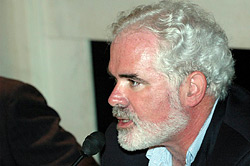
MR. HASSON: I still don’t see the difference between that and my amantadine and my carbidopa-levodopa, which is hard to come by in rural South Dakota. If I run out of it or lose it, and I don’t get a prescription for it within about 24 hours, I’ll go into convulsions. But not every pharmacist in the country is required to carry amantadine and carbidopa and levodopa, and I don’t see why every pharmacist in the country should be required to carry Plan B either.
MS. SEATON: Other questions?
VICTOR STONE, UNAFFILIATED: My question is for Mr. Hasson. I’m a lawyer, and in the legal profession, lawyers are often appointed by the court, even though it’s not their normal job, to defend guilty people who may be sex abusers who they abhor. They can’t say, “I have a conscientious objection to defending someone who I believe, from the evidence I’ve looked at, is a guilty child abuser, and I’m not going to defend him.” The court would say, “This is a profession and as an obligation of the profession you chose, you will serve all of the needs, including some that may not be to your personal liking. But you understood that when you took up the profession.” I understand there may be doctors who don’t want to treat people with syphilis because it gets them into an area they don’t like, but they’re going to have to do that too.
The example you gave of conscientious objection is a circumstance in which people are involuntarily asked to fight in a war and serve their country. They didn’t make the choice to go into that profession and, therefore, our society gives them an out if they do have a conscientious problem. Do you have some analogy for us that explains why professionals – doctors, lawyers, and pharmacists – shouldn’t know on the way in that sometimes they’re going have to do things their profession accepts – maybe it’s treating someone who is a homosexual, and they abhor homosexuality? I was hoping there was another analogy you could give us.
MS. SEATON: Can you state the gist of the question first?
MR. HASSON: The gentleman’s premise was that lawyers don’t get to walk away from court-appointed clients they find abhorrent; doctors don’t get to refuse to serve people whose behavior they find morally abhorrent; so why should pharmacists?
I quibble with that premise. As I understand the rules of legal ethics, I am required not to represent somebody that I find so morally abhorrent that I can’t be a zealous advocate for that person.
MR. STONE: You would not be excused by the court.
MR. HASSON: The canons of judicial ethics require me to refuse that case, whether it’s a court-appointed case or a case that walks in my door. I’ll bet you lunch. (Laughter.)
MS. SEATON: We’ve already eaten our lunches here, but, Jill, did you have a view on that?
MS. MORRISON: My view is the analogy I made between the doctor performing my abortion and the pharmacist handing me my pill. It’s not in the client’s interest to have you despise him and represent him, just like it’s not in your interest to have a doctor who is shaky or morally ambivalent performing your abortion. Whereas if you’re a pharmacist and you give me that pill and you don’t sleep, the pill still works.
UNIDENTIFIED QUESTIONER: I have one question. What about a medical objection? The FDA came out controlling the OrthoNovum because it was creating dangerous blood clots in women’s bodies. Could pharmacists have a medical objection pursuant to their licenses and their affirmative obligation to provide health care?
MS. MORRISON: Yes, absolutely. If a pharmacist identifies a contraindication or a dosage problem, or believes that a prescription was fraudulently written, then yes, they have an obligation to refuse.
UNIDENTIFIED QUESTIONER: Am I right that women over 18 are currently able to get Plan B without a doctor’s prescription?
MS. MORRISON: For over 18, that should be going into effect in November, yes.
UNIDENTIFIED QUESTIONER: In that case, since the doctor is now out of the picture for women over 18, and there is no longer someone in particular concerned about what’s best for a woman’s health, would you reject the idea of a pharmacist making conscience-motivated judgments in all cases? Imagine a patient who repeatedly gets Plan B. A pharmacist might say such large doses of contraception would not be advisable for health reasons and refuse to fill the prescription. That would be a conscience-related judgment because the pharmacist would be guessing what’s right or wrong for that person.
[over-the-counter]
NICOLE GUSTAFSON, OFFICE OF SENATOR CHUCK GRASSLEY: My question is for Ms. Morrison. You repeated several times today that if pharmacists don’t want to prescribe these medicines, then they can go into a different field or another area of health care. In these rural areas you keep speaking about, there may be only one pharmacist. So if you eliminate that pharmacist, then you eliminate access to all drugs for all people.
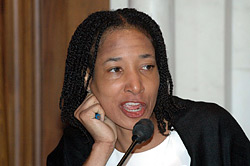
MS. MORRISON: I’ve heard that before. And if we saw that becoming a problem, then perhaps there would be something we could work out. But if pharmacies were closing on this basis, I’d be very surprised to see that happen, and then I’d go back to the market. If there was a rural area with no pharmacy in it, presumably another pharmacy would come fill that void. But I see the slippery slope problem – the idea that we’re driving pharmacies out of business – and I really don’t see that happening.
MS. GUSTAFSON: But you’re kind of contradicting yourself there. You’re saying that rural areas don’t have enough to go around to – (inaudible) – so wouldn’t the market govern that, with more pharmacies going into these rural areas to serve more people, if what you’re saying is correct?
MS. MORRISON: I’m saying I want to see the pharmacies that are closing down because someone is forcing them to dispense the morning-after pill. I don’t think that’s happening. I can see the hypothetical and how it could all play out, and we could be denying access to rural areas because we’re forcing all these pharmacies to do this, but I don’t believe that problem is very real.
MS. SEATON: We’ll take the question right here.
TODD CURRY, OFFICE OF REPRESENTATIVE SOLOMON ORTIZ: I was wondering if you could respond to the comment that there are other reasons why a pharmacist may either not have a prescription or not fill it. What is to prevent a pharmacist from using those reasons as a pretext for their fundamental beliefs? Do you think there should be a mechanism to prevent that?
MS. MORRISON: The pretext issue has been a problem. In Illinois, the enforcement agency that oversees their pharmacy rule has identified this as a problem. But how can you get to pharmacists that will just lie to your face about the availability of a drug? You really can’t. That’s their ethics and that’s for them to deal with, presumably with their God whom they’re very close to. But to actually deny a woman, to lie professionally – it’s unprofessional conduct. Once again, you’re governed by your license; whether or not you follow every rule, only you know. That’s really not something we can prevent. We do know pharmacies where it’s been on the shelves, and pharmacists have said we don’t have it. We know that’s happened.
MS. SEATON: In the back?
JENNIFER VESEY, OFFICE OF SENATOR RICK SANTORUM: We do regulate healthcare providers. We have a right to access, as you say, but that doesn’t mean we have guaranteed easy access. That’s why we don’t regulate that a pharmacy or an abortion clinic has to be on every corner. I think this is what you were getting to in the earlier question, that there’s a distinction between having a right to and being guaranteed quick and easy access to.
If gynecologists want to prescribe this medication, and they’re concerned about access, then it seems like a perfect opportunity when they’re asking a patient, “Are you sexually active, and what birth control are you using?” to say, “That’s great; you’re using X, Y, Z, whatever birth control you’re using; let me write you a prescription for Plan B just in case that fails. You might have problems getting it at every pharmacy on the corner; here’s a mail-order service I know that will fill it for you. Have it on hand; don’t find yourself in that situation.”
I fear that by putting it over the counter, it’s taking the doctor out of that relationship with the patient, where they can have conversations about birth control choices and overall health. If you’re not coming in for routine pap smears so the doctor can catch these things, then the doctor is not talking to you about the HPV vaccine, for example. Why aren’t the gynecologists proactively prescribing this? It’s supposed to be Plan B; it’s not supposed to be Plan A. So talk to the patient about what Plan A is and make sure that they know how to access Plan B if they need it.
MS. MORRISON: I completely agree with you, and there is a campaign called “back up your birth control” that tries to do just that. It encourages women to ask for advance prescriptions and then make sure they have it on hand, so I completely agree.
But on another issue you raised: There are already OTC forms of birth control that don’t require women to have that conversation with the doctor and talk about HPV and the number of sexual partners. Condoms and sponges are all out there, and they have been for awhile, because they are likewise safe and effective – perfect for OTC use. So this isn’t anything new when you’re talking about access to contraceptives without a doctor’s input.
Finally, regarding the market, there’s no guarantee that there is a drug store on every corner. But there is some basic belief that when you go to a drug store, it’s going to have drugs, and you’re going to be able to get what you need. Every single drug at every single drug store – no, you might have to order some things. But there is a general expectation that pharmacists are really there to help you get the drugs that you need. And also within some state regulations, there are requirements that licensed pharmacies have enough drugs and the type of drugs to meet the demand of the population they serve.
I think these are excellent provisions. It means that when you are assessing the community you serve – if you look around and you’re near a college campus, there are certain drugs you should have. If you’re near a retirement community in Florida, and you don’t have nitroglycerin for heart disease, or you don’t have insulin, then you’re not serving your community adequately. This is very important. We are not demanding that every single drug store in America always have at least three packs of Plan B on hand. We’re asking just for reasonable access and to not be refused on the basis of the individual’s religion – the pharmacist’s religion – when that actually gets in the way of my access to healthcare.
MS. SEATON: Did you want to weigh in on this, Seamus?
MR. HASSON: Just to note that saying “the pharmacist’s religion gets in the way of my access to healthcare” is a fairly tendentious way of referring to claims of conscience, as opposed to claim of access to a prescription drug.
ROGER SEVERINO, BECKET FUND FOR RELIGIOUS LIBERTY: Why can’t this issue be seen as one of minority rights? In the workplace, if you’re black, if you’re a woman, if you’re a homosexual in more localities, you do not have to shed your identity when you walk in the door; you don’t have to force yourself to choose a different career because of your identity and your core belief. You can express it even if it actually hurts business, even if the business says, “Our client won’t like it if you look or act this way.” Why isn’t the issue of conscience the exact same thing, when the minority beliefs are religiously grounded or deeply rooted?
[religious belief]
MS. SEATON: Additional questions? If there are not any more burning questions, I will ask whether each panelist wants to make a quick set of wrap-up remarks, to highlight key issues for people to think about as they leave.
MR. HASSON: It was President George Washington who said he thought the laws of the country should be extensively accommodated to the conscientious scruples of all, insofar as the national interest allowed. It has been the policy of the United States ever since Washington’s time – for example, the Vietnam War’s extension of conscientious objection to philosophical conscientious objectors – to say that conscience is a good thing, a constitutional good that deserves special protection. It’s not a constitutional nuisance that gets in the way of the good life. The more conscientious people we have and the more we accommodate conscience and hold it up as a constitutional good, the better society we’ll be and the fewer pharmacists we’ll have who lie about whether they have drugs there or not.
MS. MORRISON: I think that being here in Washington, we can get this idea that access is very easy, when actually we get these calls from women who have been refused, and it’s not just a matter of going to the next drug store. It is a real violation of what they have come to expect from professionals when they’re simply seeking treatments that their doctors have determined they should have. We can’t just leave this to the market, and if the problem keeps growing, then more regulation will be needed. I hope that’s not the case. I also hope that the worst cases – like the pharmacist who refuses to even transfer a prescription or the pharmacist who won’t give a prescription back because it’s aiding and abetting murder – I hope these cases don’t continue to drive our law and policy. But with the OTC approval, more people will become aware of this, and we’ll have to see how it plays out once there is greater access.
MS. SEATON: Please join me in thanking our panelists for this discussion.
(Applause.)
This transcript has been edited for clarity, style and grammar by Andrea Useem.




